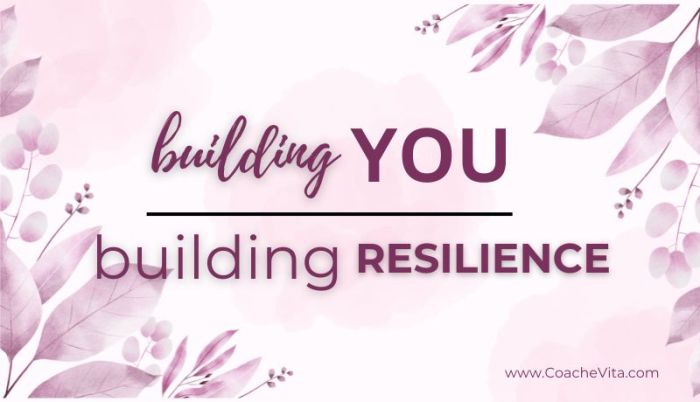
Building resilience is a crucial skill that empowers individuals to navigate through life’s challenges with strength and determination. By understanding resilience, we can appreciate its role in personal development and learn from the journeys of those who have faced adversity and emerged stronger. Resilience is not merely about enduring tough times; it involves a psychological process that fosters growth and adaptation.
In this discussion, we will explore effective strategies to enhance emotional strength, maintain a positive mindset, and cultivate supportive relationships that contribute to building resilience. We will also delve into self-help approaches, including resources and mindfulness practices, that can aid in strengthening our ability to bounce back from difficulties.
Understanding Resilience

Resilience is the ability to adapt and bounce back from adversity, challenges, and setbacks. It’s a critical component of personal development, emphasizing the importance of mental strength and emotional well-being. The significance of resilience lies not only in overcoming obstacles but also in fostering growth, enhancing problem-solving skills, and enriching life experiences.Resilient individuals often display remarkable stories of perseverance. For instance, J.K.
Rowling faced numerous rejections before the Harry Potter series became a global phenomenon, demonstrating how tenacity and belief in oneself can lead to unprecedented success. Similarly, Oprah Winfrey overcame a turbulent childhood marked by poverty and abuse, ultimately becoming a media mogul and philanthropist. These examples illustrate that resilience can transform challenges into stepping stones for personal and professional achievements.
Psychological Processes Involved in Building Resilience
Building resilience involves several psychological processes that contribute to an individual’s ability to cope effectively with stress. These processes are not only about enduring hardship but also about thriving in the face of it. The core components include:
- Emotional Awareness: Recognizing and understanding emotions allows individuals to manage their responses to stressors more effectively. Individuals who can identify their feelings can better navigate challenges without becoming overwhelmed.
- Positive Thinking: Maintaining an optimistic outlook even during tough times has been shown to enhance resilience. This mindset fosters hope and motivates individuals to seek solutions rather than dwell on problems.
- Problem-Solving Skills: The ability to analyze situations and develop practical solutions is crucial. Resilient people often approach difficulties with a solution-oriented mindset, which enables them to tackle issues directly and efficiently.
- Social Support: Building strong networks of friends, family, and community is essential for resilience. These relationships provide emotional support and practical help, enhancing an individual’s capacity to cope with stress.
- Flexibility and Adaptability: Resilient individuals are often willing to change their approaches when faced with new challenges. This adaptability allows them to adjust their strategies to better suit the circumstances they encounter.
Resilience is not just about enduring hardships but also about learning from them to become stronger and more capable.
Understanding and developing these psychological processes can significantly enhance one’s resilience, leading to a more fulfilling and successful life. Practical applications of these concepts can be seen in various self-help programs and psychological therapies aimed at fostering resilience in individuals from all walks of life.
Strategies for Building Resilience

Building resilience is essential for navigating life’s challenges and emerging stronger from adversity. It involves developing emotional strength, maintaining a positive mindset, and fostering supportive relationships. By implementing effective strategies, individuals can enhance their capacity to adapt and thrive amid stress and uncertainty.
Enhancing Emotional Strength and Adaptability
Strengthening emotional resilience is crucial for effectively dealing with life’s ups and downs. Practicing self-awareness and emotional regulation can significantly boost one’s ability to adapt to changing circumstances. Here are some techniques to consider:
- Mindfulness Meditation: Engaging in mindfulness helps in tuning into one’s thoughts and emotions without judgment, promoting a sense of calm and clarity.
- Journaling: Regularly writing down thoughts and feelings can enhance self-reflection and emotional processing, making it easier to cope with difficult situations.
- Setting Realistic Goals: Establishing achievable goals fosters a sense of purpose and accomplishment, which can bolster emotional strength during challenging times.
Maintaining a Positive Mindset During Adversity
A positive mindset serves as a powerful buffer against stress and adversity. Cultivating optimism involves reframing negative thoughts and focusing on potential solutions. The following methods can help in sustaining a positive outlook:
- Practice Gratitude: Regularly acknowledging things one is grateful for can shift focus away from negativity and build resilience.
- Visualize Success: Creating mental images of successful outcomes can enhance motivation and optimism, preparing individuals to face challenges head-on.
- Affirmations: Repeating positive affirmations encourages self-belief and counters self-doubt, reinforcing a resilient mindset.
Establishing Supportive Relationships
Having a strong support system is vital for resilience. Supportive relationships can provide emotional comfort and practical assistance during tough times. To cultivate such connections, consider the following guidelines:
- Engage in Active Listening: Being present and genuinely listening to others fosters deeper connections and encourages mutual support.
- Seek Out Community: Joining groups or communities with shared interests can provide a sense of belonging and a network of support during challenges.
- Be Open to Vulnerability: Sharing personal struggles with trusted friends or family can strengthen bonds and create an environment of empathy and support.
Self-Help Approaches to Resilience

Building resilience is a personal journey that can be significantly enhanced through self-help resources and practices. By actively engaging with materials designed to foster resilience, individuals can equip themselves with effective strategies to handle life’s challenges. This section delves into various self-help resources, Artikels a self-improvement plan for resilience, and discusses the vital role of mindfulness and self-care in developing a robust inner strength.
Self-Help Resources for Resilience
A variety of self-help resources are available to guide individuals in their quest to build resilience. Books and workshops can provide insights, techniques, and community support, making the process more accessible and relatable. Here are some valuable resources:
- “The Resilience Factor” by Karen Reivich and Andrew Shatté: This book offers a comprehensive approach to understanding resilience, detailing the skills that can be developed to improve one’s ability to bounce back from adversity.
- “Option B” by Sheryl Sandberg and Adam Grant: This powerful narrative combines personal story with research on resilience, illustrating how to find joy and strength after life’s most challenging moments.
- Mindfulness workshops: Many local organizations and online platforms offer workshops focused on mindfulness practices. Engaging in these can help individuals cultivate present-moment awareness, which is crucial for resilience.
- Online courses: Platforms like Coursera and Udemy have courses that teach resilience-building skills, often featuring expert-led sessions and interactive components.
Self-Improvement Plan for Resilience
Creating a self-improvement plan that integrates resilience-building practices involves intentional steps and consistent effort. This structured approach helps individuals to develop habits that foster resilience. An effective plan could include the following components:
- Daily Journaling: Spend 10-15 minutes each day reflecting on challenges faced, responses to those challenges, and lessons learned. This practice can help in recognizing patterns and developing coping strategies.
- Regular Physical Activity: Engaging in exercise at least three times a week can significantly boost mood and mental health, providing a solid foundation for resilience.
- Setting Realistic Goals: Establish achievable short-term and long-term goals. This helps to create a sense of purpose and accomplishment, reinforcing confidence in one’s abilities.
- Building a Support Network: Surrounding oneself with supportive friends and family fosters a sense of belonging and security, which are essential in times of stress.
Role of Mindfulness and Self-Care in Resilience
Mindfulness and self-care practices play a crucial role in enhancing resilience by promoting emotional regulation and self-awareness. Integrating these practices into daily life can yield significant benefits. Here are some essential aspects of mindfulness and self-care that contribute to resilience:
- Mindfulness Meditation: Regular mindfulness meditation can reduce stress and enhance emotional well-being. It allows individuals to observe their thoughts and feelings without judgment, fostering a greater sense of control over responses.
- Self-Care Rituals: Establishing a routine that prioritizes physical and emotional health—such as getting sufficient sleep, eating nutritious meals, and engaging in hobbies—can recharge one’s resilience reserves.
- Practicing Gratitude: Keeping a gratitude journal can shift focus from negative experiences to positive ones, enhancing overall outlook and resilience.
- Breathing Exercises: Simple breathing techniques can help manage anxiety and restore calm during stressful situations, making it easier to respond with resilience.
Ending Remarks
In summary, building resilience is an ongoing journey that requires intentional effort and self-reflection. By embracing the strategies and self-help techniques discussed, individuals can develop the emotional tools needed to face life’s obstacles head-on. Remember, resilience is not just about surviving adversity; it’s about thriving in spite of it, turning challenges into opportunities for personal growth.
FAQ Compilation
What is resilience?
Resilience is the ability to adapt to and recover from adversity, stress, and challenges.
How can I start building resilience?
Begin by identifying your support systems, practicing mindfulness, and developing a positive mindset.
Are there specific resources for learning about resilience?
Yes, numerous books, workshops, and online courses focus on building resilience.
Can resilience be learned or is it innate?
Resilience can be learned and developed through practice, experiences, and intentional strategies.
How does mindfulness contribute to resilience?
Mindfulness helps individuals remain present and manage stress, which strengthens their ability to cope with challenges.





